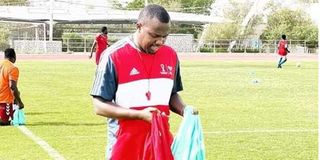
FC Kenya Qatar social club on a Friday football Kick about in Qatar.
Are pastures still green if the heart is heavy with longing? This is a question that often plagues Kenyans working abroad, as they navigate the challenges of living far from home and family.
Driven by the allure of better opportunities and higher pay, many Kenyans find themselves in countries like Qatar, where they face long working hours, limited time for relaxation, and the absence of a close-knit support system. While social media offers a temporary escape, it cannot replace the warmth of physical human connections.
Qatar has become an increasingly popular destination, with 59,000 Kenyans currently residing there, according to official data from the Qatari government and records from the Kenyan embassy two years ago. To explore how these Kenyans navigate their lives as expatriates, Lifestyle spoke to four individuals who have found a home away from home through a social club called FC Kenya Qatar. This community serves as a lifeline, offering a space to reconnect with their identity, share the joys and struggles of expat life, and draw strength from shared experiences.
In 2009, John Ngurugwe, rather than “arriving” as per the Kenyan parlance when one flies out of the country to pursue greener pastures, found himself sharing a room with six people, a kitchen with 20 others, and a restroom with many more. In this unfamiliar territory, he battled both harsh working conditions and insecurity while employed as a security guard.
The allure of overseas opportunities is often exaggerated by dubious travel agents who sell dreams of prosperity to impressionable Kenyans.
Change jobs
“I was told Qatar was just a brief stepping stone to get me to Dubai, where I could then change jobs after a short period,” recalls John, who has been in the Gulf country for about 15 years. “But when I arrived, I learned my contract tied me to that security firm for a minimum of five years with no ability to leave.”
Fortunately, his supervisors quickly recognised his potential and intellect, helping him secure roles better suited to his interests and educational background in journalism.
Over the next decade, John progressively upgraded his employment opportunities, working in facilities management roles at prestigious institutions like Georgetown University and the University College London. Today, he serves as an emergency management coordinator at Texas A&M University’s Qatar campus. During this period, he also pursued further education, obtaining a degree in Security Studies and Criminology from Mount Kenya University to complement his journalism credentials and broaden his professional skillset.
On the social front, John, commonly known as “O'Shea,” was drawn to community work. He felt a strong desire to help others avoid the pitfalls he had encountered by providing them with the necessary knowledge and resources. A few years ago, he contributed to the development of a Qatar-focused content app called Just Good Work, launched in 2019.
The app covers vital topics like understanding employment contracts and rights, locating home country embassies and support services, and knowing where to turn if problems or disputes arise on the job in places like Qatar. John's involvement in the Good Work app is an extension of his longstanding advocacy for protecting migrant worker welfare—an issue he has become a vocal champion for in Qatar. His expertise on these matters has led to interviews with major global media outlets like the BBC, allowing him to amplify concerns about workers’ rights, treatment, and ethical recruitment practices.

FC Kenya Qatar social club on a Friday football Kick about in Qatar.
When the Kenyan embassy first opened in Doha in 2010, John was one of the community leaders who welcomed the inaugural ambassador. Over a decade later, he wears many influential hats in serving and uplifting Qatar's large Kenyan diaspora community.
“O'Shea” is best known for his pioneering work in sports and cultural activities. In 2010, he founded the FC Kenya football club, starting with informal pickup soccer games at local parks. As the years went on, John, who loves football, realised these casual games were not sustainable.
Local tournaments
He dreamed of creating a proper Kenyan community football team in Doha. What started as 5-a-side games on a small pitch every Friday has grown into a full-fledged club with 40 to 60 players gathering weekly, and over 300 members overall. FC Kenya has professionalised, complete with an official name, management structure, and proper uniforms, some sponsored by companies like ABC Bank in Kenya.
The team has been invited to participate in prestigious local tournaments like the annual Ramadan Cup.
Beyond football, the social club offers advice on financial planning, shares information about educational opportunities, and even helps members navigate the process of starting small businesses back in Kenya. John’s biggest annual undertaking is coordinating the Diamond League athletics meet when it comes to Doha.
He has mobilised over 6,000 Kenyans to pack stadiums like the Qatar Sports Club to cheer on the country’s elite athletes competing on the international stage. One particularly memorable moment was the September 2023 friendly football match between Qatar and Harambee Stars, where Kenya won. John’s efforts led to global headlines about the overwhelming Kenyan fan turnout and support. He also supports the “Green Maasai Troop,” which performed at the 2022 World Cup in Qatar.
Unexpected turns
Simon Makacha, 35, a former professional footballer, embodies the unexpected turns life can take. "The last time I kicked a ball professionally was in 2017," Makacha recalls. "I was playing for Wazito FC in Kenya. At the time, things were okay in Kenyan football, but you know how it is—it doesn't pay so well.” In June 2017, Makacha embarked on a journey to the Gulf, hoping to chart a new path. But the transition was far from smooth. “It wasn't easy,” he admits. "The agent misled me. It took me around six months before I found a job.”
Like John, Makacha’s experience mirrors that of many Kenyans who arrive in Qatar with high hopes, only to face the harsh realities of expat life. “When I came, it wasn't the job I was expecting,” he says. “But after arriving, what could I do? We have to adjust and make a living, you know.”
It’s this spirit of adaptation that FC Kenya embodies. Every Friday, these men come together not just to play football but to share their experiences, offer support, and find moments of joy amidst the challenges of their expat lives. "FC Kenya, it's like a home. Family away from family, you know,” Makacha explains.

Nitsa Akinyi, a 29-year-old expat working in Qatar and part of Qatar social club.
The weekly gatherings have become a cherished ritual for many. After the morning prayers, they meet on the pitch, play their hearts out, and then return home for a well-deserved rest before the workweek begins anew. “We laugh together, you forget everything about the job, and your mind becomes refreshed, so life becomes easier,” Makacha comments.
But FC Kenya is more than just a social club. It has evolved into a crucial support network that helps its members navigate the complexities of expat life. From assistance with visa issues to providing a connection to the Kenyan embassy, the group has become an invaluable resource.
The importance of this community becomes even more apparent when considering the challenges many Kenyan expats face. Makacha candidly discusses the reality of working abroad: “The expectations you come with, you think you'll get this job and earn maybe Sh200,000, Sh300,000 every month. Okay, there are jobs that pay like that, but it depends on your qualifications and the job you've landed.”
He advises newcomers to adjust their expectations and be prepared for challenges. "If you come with those high expectations, you’ll find it hard to survive here because you'll be conflicting with people at work every day, as your mind is not there,” Makacha cautions.
“For me, I chose self-improvement,” Makacha explains. He spends his free time on personal training and reading, keeping his mind and body active. "Once in a while, once a month, I can have a drink or two with my friends. But it's not a go-to place for me every Friday, no.”
Kenyan expat community
This shift in priorities reflects a broader change in the Kenyan expat community. Many have realised that while the party scene might offer temporary escape, true fulfilment comes from personal growth, community building, and planning for the future.
Nitsa Akinyi, 29, arrived in Qatar in December 2019 without the hassle of a travel agent, as the company contracting her handled the immigration details. She found herself working 12-hour shifts from 5am to 4pm as a janitor at a school. The work was demanding, but she was determined to make the most of the opportunity.
It was during a community game event in Qatar that she met John, who introduced her to a world she thought she had left behind in Kenya—football.
“O'Shea introduced me to a team formed by Kenyans in Qatar, a ladies’ football team,” she recounts.
Despite a prior injury that had sidelined her in Kenya, she joined the team as a goalkeeper. This decision was a turning point. After just a month of play, including a beach tournament, she caught the eye of a coach from Al-Ahli, a local Qatari team. “The coach sought me and asked me to join his team," she says, still amazed by the turn of events. She signed a six-month contract with Al-Hali, marking the beginning of her professional football career in Qatar.
But her football journey didn’t end there. After a brief hiatus, she joined Qatar Sports Club, where she has been playing for the past three years. “I enjoy playing for that team,” she reveals. “We have all the facilities we need as a team or as a player.” Football has become more than just a sport for her; it’s a lifeline, a way to beat the boredom and homesickness that often plague expat life. “Mostly when I leave work and I’m free, I go for training,” she explains. “It's always football, and I enjoy it.”
Yet, life in Qatar is not without its challenges. The scorching heat is relentless, with summers dragging on endlessly. The cultural differences are distinct—weekends fall on Fridays and Saturdays, a schedule that took some getting used to. The restrictions on social life and entertainment options are a far cry from the freedom she enjoyed back home.
The hardest part is the distance from loved ones. “My first six months were the worst,” she admits. “I used to cry every day, wanting to go back home.” But as time passed, she found ways to cope. Video calls with family and friends became a regular fixture in her life, bridging the gap between Qatar and Kenya.

George Kamau Coaching the FC Kenya Qatar Social Club.
Despite the challenges, she recognises the positive impact of her time in Qatar. “It makes you disciplined if you weren’t disciplined before,” she reflects. “It makes you concentrate on your work and what you want to attain in life.”
For George ‘Marley’ Kamau, 37, who has called Qatar home for nearly eight years, the journey has been one of transition and growth. A lifelong footballer with stints at the Intercontinental Hotel and Kenya Airways—his last workplace in Kenya—he recently traded his playing boots for a coaching whistle. “Last year in 2023, I hung up my boots. I am now coaching the team, the Kenyans in Qatar. We have a team, FC Kenya Qatar.”
In December 2016, an opportunity to work in Qatar presented itself. Recalling the event, he says, “I got the opportunity through a fellow footballer. I just got a call, they asked me if I have a passport. And luckily I had one. They sent me a ticket and visa, and I went just like that, so I didn't pay anything.”
Working as a customer service agent in a real estate firm, George’s journey is far from the stereotypical narrative often associated with migrant workers in the Gulf. “There are things you are told,” he explains, touching on the initial culture shock. “For example, if our company tells you, religion and politics, you shouldn't indulge. You respect people, women are very respected.”
Yet, it’s not all work and football for George and his fellow expatriates. Contrary to popular belief, Qatar offers a vibrant social scene that rivals many global cities. “There are a lot of things to do,” George says, when asked about leisure activities. “First of all, they have amenities. You can go to the parks. There is a viewpoint where you can go play.”
The nightlife, too, defies expectations. “There are clubs, there are joints, and all that,” George reveals. “You can party, you can go to the club, you can drink as much as you want. There are alcohols, beers, whiskeys, everything is there.” The only limitation? 2am is the closing time for clubs, unlike in Kenya, where people can party until the early morning hours. George sees this as a practical measure. “It’s also good because if you have a job in the morning, you get ample time to go and rest.”
"The only challenge I can say is homesickness,” George admits. “Because some of us have contracts whereby you are only go home after two years for vacation.” Yet, he’s quick to point out the support systems in place, from free Wi-Fi enabling constant connection with loved ones back home to the vibrant FC Kenya expatriate community that forms a home away from home.







